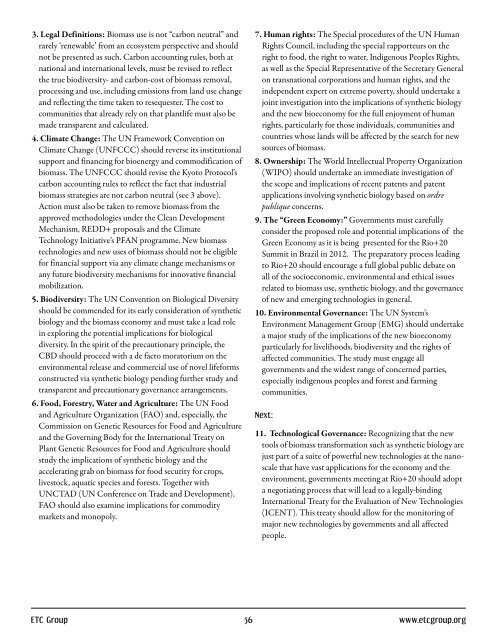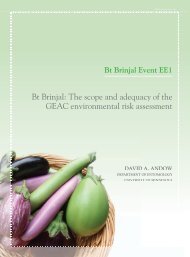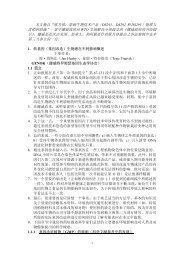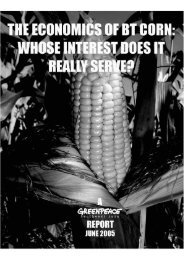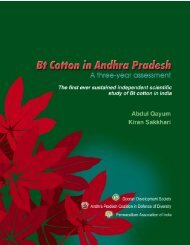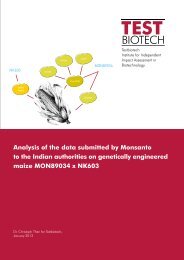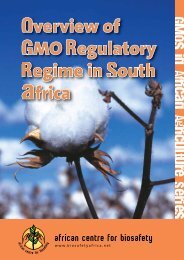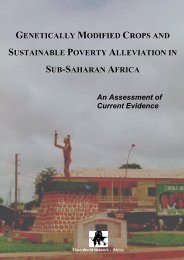English - pdf - 2145 Kb - Biosafety Information Centre
English - pdf - 2145 Kb - Biosafety Information Centre
English - pdf - 2145 Kb - Biosafety Information Centre
- No tags were found...
Create successful ePaper yourself
Turn your PDF publications into a flip-book with our unique Google optimized e-Paper software.
3. Legal Definitions: Biomass use is not “carbon neutral” andrarely ‘renewable’ from an ecosystem perspective and shouldnot be presented as such. Carbon accounting rules, both atnational and international levels, must be revised to reflectthe true biodiversity- and carbon-cost of biomass removal,processing and use, including emissions from land use changeand reflecting the time taken to resequester. The cost tocommunities that already rely on that plantlife must also bemade transparent and calculated.4. Climate Change: The UN Framework Convention onClimate Change (UNFCCC) should reverse its institutionalsupport and financing for bioenergy and commodification ofbiomass. The UNFCCC should revise the Kyoto Protocol’scarbon accounting rules to reflect the fact that industrialbiomass strategies are not carbon neutral (see 3 above).Action must also be taken to remove biomass from theapproved methodologies under the Clean DevelopmentMechanism, REDD+ proposals and the ClimateTechnology Initiative’s PFAN programme. New biomasstechnologies and new uses of biomass should not be eligiblefor financial support via any climate change mechanisms orany future biodiversity mechanisms for innovative financialmobilization.5. Biodiversity: The UN Convention on Biological Diversityshould be commended for its early consideration of syntheticbiology and the biomass economy and must take a lead rolein exploring the potential implications for biologicaldiversity. In the spirit of the precautionary principle, theCBD should proceed with a de facto moratorium on theenvironmental release and commercial use of novel lifeformsconstructed via synthetic biology pending further study andtransparent and precautionary governance arrangements.6. Food, Forestry, Water and Agriculture: The UN Foodand Agriculture Organization (FAO) and, especially, theCommission on Genetic Resources for Food and Agricultureand the Governing Body for the International Treaty onPlant Genetic Resources for Food and Agriculture shouldstudy the implications of synthetic biology and theaccelerating grab on biomass for food security for crops,livestock, aquatic species and forests. Together withUNCTAD (UN Conference on Trade and Development),FAO should also examine implications for commoditymarkets and monopoly.7. Human rights: The Special procedures of the UN HumanRights Council, including the special rapporteurs on theright to food, the right to water, Indigenous Peoples Rights,as well as the Special Representative of the Secretary Generalon transnational corporations and human rights, and theindependent expert on extreme poverty, should undertake ajoint investigation into the implications of synthetic biologyand the new bioeconomy for the full enjoyment of humanrights, particularly for those individuals, communities andcountries whose lands will be affected by the search for newsources of biomass.8. Ownership: The World Intellectual Property Organization(WIPO) should undertake an immediate investigation ofthe scope and implications of recent patents and patentapplications involving synthetic biology based on ordrepublique concerns.9. The “Green Economy:” Governments must carefullyconsider the proposed role and potential implications of theGreen Economy as it is being presented for the Rio+20Summit in Brazil in 2012. The preparatory process leadingto Rio+20 should encourage a full global public debate onall of the socioeconomic, environmental and ethical issuesrelated to biomass use, synthetic biology, and the governanceof new and emerging technologies in general.10. Environmental Governance: The UN System’sEnvironment Management Group (EMG) should undertakea major study of the implications of the new bioeconomyparticularly for livelihoods, biodiversity and the rights ofaffected communities. The study must engage allgovernments and the widest range of concerned parties,especially indigenous peoples and forest and farmingcommunities.Next:11. Technological Governance: Recognizing that the newtools of biomass transformation such as synthetic biology arejust part of a suite of powerful new technologies at the nanoscalethat have vast applications for the economy and theenvironment, governments meeting at Rio+20 should adopta negotiating process that will lead to a legally-bindingInternational Treaty for the Evaluation of New Technologies(ICENT). This treaty should allow for the monitoring ofmajor new technologies by governments and all affectedpeople.ETC Group 56 www.etcgroup.org


